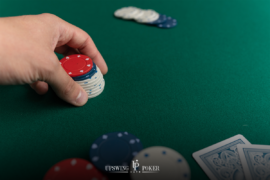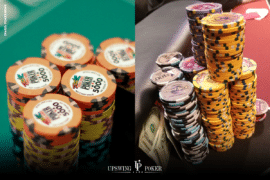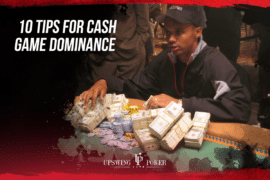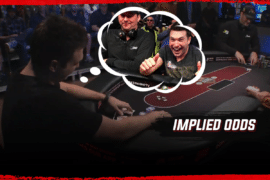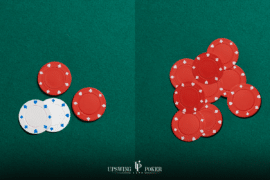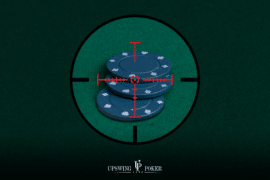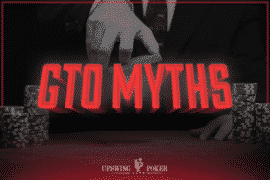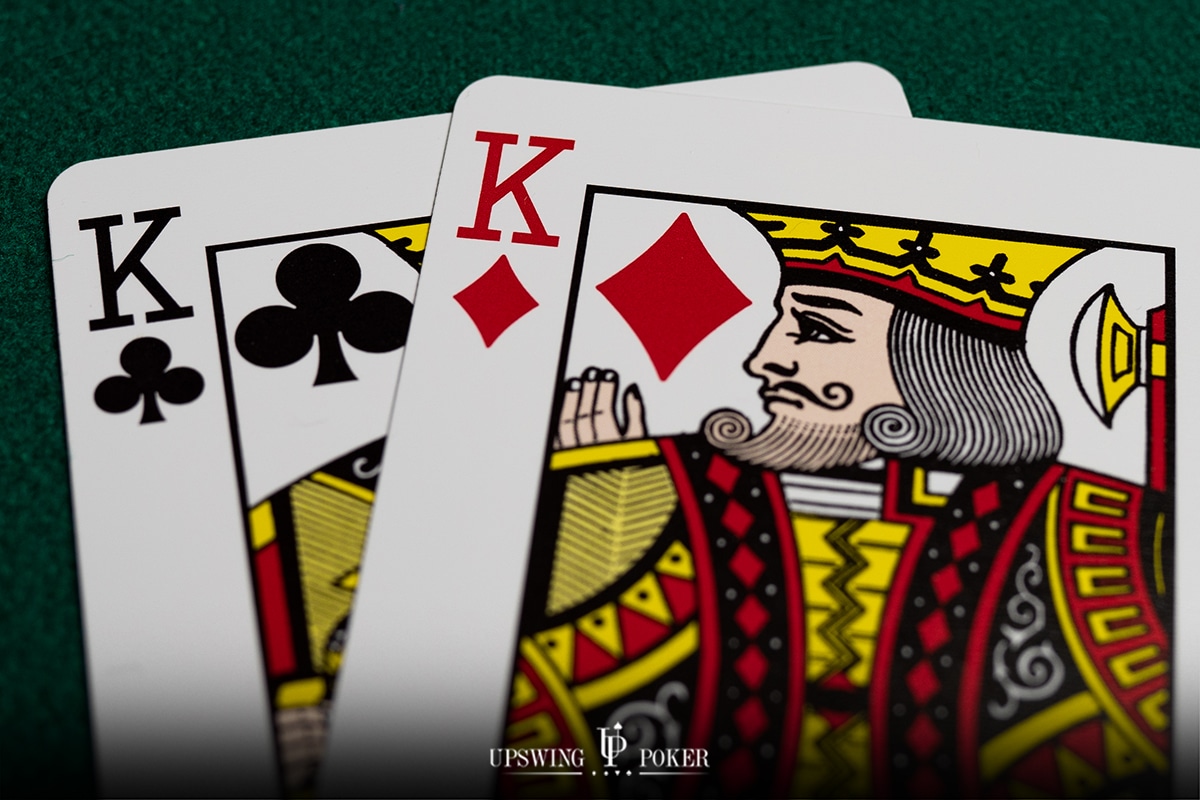
How Elite Poker Pros Play Pocket Kings Postflop
Everyone gets a nice hit of dopamine and adrenaline when they’re dealt pocket Kings.
Your unconscious mind expects a big win, but it might also remember all the times things went off script (like when that dreaded Ace lands on the flop).
In this article, I’ll break down how to approach playing pocket Kings postflop and give you a clear framework for decision-making based on Uri Peleg’s approach.
Why You Should Trust the Advice in this Article

Uri Peleg is the world’s best poker coach.
Think that’s hyperbole? The facts don’t lie:
- Uri’s top students (like Barak Wisbrod and Owen Messere) have won millions of dollars in high stakes cash games
- Through his Guerrilla Poker stable, he’s helped turn many breakeven low stakes players into winning medium and high stakes players
- He doesn’t just teach — he’s won millions on the felt himself too
This entire article is based on an unreleased video from Uri Peleg. That video (and many more) will be released in the Upswing Lab this summer.
You’re in good hands.
A Metaphor to Understand the Changing Value of Pocket Kings
While pocket Kings are an absolute powerhouse preflop, their value can shift dramatically once the flop hits.
So, what should you do when the flop comes down bad for Kings?
Uri offers a metaphor to help frame it:
Imagine you have a beautiful singing voice that you’ve practiced your entire life, but you’re born in a place where everyone is deaf, or singing is illegal. The value of your voice is suddenly greatly diminished.
The same thing happens with Kings. Sometimes they’ll still be a very strong hand—like a set, or an overpair on a dry, disconnected flop. But other times, they drop to medium strength—like an overpair on a two-tone connected board or a monotone flop.
The value of the hand depends entirely on the situation. To play it well, you must let go of the fixed idea that you’re holding a premium hand.
And that mindset shift will help your game across the board, not just with pocket Kings. Continuously re-evaluating your hand’s strength based on the board texture and betting action is a core principle of strong poker.
The Constant Process of Re-Evaluation
In this section, let’s focus on the constant process of re-evaluating pocket Kings based on board texture and betting action, rather than diving into deep technical analysis.
The hands you’ll see below are taken from the recent Cash Game World Championship, which wrapped up just a few months ago. Every one of these hands were played by top-tier cash game professionals.
By the way, the winner of the Cash Game World Championship was Uri’s student Owen “PR0DIGY” Messere.
Hand #1
“Lolvoidaments” open-raises from the Cutoff, and “riggeddeck” 3-bets from the Small Blind with pocket Kings (Kc Kh). The Cutoff calls.
Initial value assessment: Kings are extremely strong at this point.
The flop comes Qc 4c 4d.
Value reassessment: Kings are still a premium holding here. This board doesn’t connect much with the Cutoff’s range in terms of trips or quads—only hands like 54 suited and pocket 4s are realistically in play.
Riggeddeck checks, and lolvoidaments fires a 25% pot bet.
Value reassessment: Kings are still very strong. There are very few hands that beat them in this spot.
Riggeddeck responds with a 3.5x check-raise, targeting value from Qx and weaker hands. Lolvoidaments calls.
The turn is the 6c.
Value reassessment: With the flush completing on the turn, the value of Kings takes a significant hit. This is no longer a hand you’d feel good about getting all-in with.
Riggeddeck opts for a block bet, which aligns with our updated evaluation of the hand’s strength.
Lolvoidaments responds with a 2.5x raise.
Value reassessment: For the first time in the hand, our opponent is signaling that they might have us beat. This is the moment where your evaluation needs a serious shift—it’s time to move from offense to defense. The question now is whether Kings are strong enough to call against this raise.
You go back to the fundamentals: equity, pot odds, implied odds, and stack-to-pot ratio. With a draw to the second-nut flush and four outs to a full house, facing a relatively small raise, pocket Kings are still strong enough to continue.
From an emotional standpoint, your excitement needs to come down. You have to accept that there’s a good chance you’re behind in the hand, but that calling is still likely the highest expected value option.
Riggeddeck calls, and the river is an Ace.
Value reassessment: The rivered Ace only reinforces what was already apparent on the turn—Kings are now in full bluff-catcher mode. That doesn’t necessarily mean you want to call, just that you’re only beating bluffs at this point.
Riggeddeck checks, the opponent checks back and shows 54s for flopped trips.
Hand #2
KevinPaque open-raises with pocket Kings from the Small Blind. PR0DIGY calls from the Big Blind.
Value assessment: Pocket Kings are very strong at this point.
The flop comes Ah 6d 6c—a rainbow board.
Value reassessment: Time to pump the brakes. What was a premium hand preflop has taken a big hit. You’re now losing to any Ace, and of course to any 6. It’s not an exciting spot—this is a hand that wants to keep the pot small.
KevinPaque checks, PR0DIGY makes a small bet, and Kevin calls.
The turn is the Js.
Value reassessment: Not much changes. Kings are still behind all the same hands—any Ace, any 6—and there aren’t many new hands you’re beating now. The goal remains the same: keep the pot small.
Kevin checks, and PR0DIGY checks back.
The river is the 4h.
Value reassessment: The value of Kings improves slightly here, based on your opponent’s passive line on the turn. By checking back, he’s signaled that he likely doesn’t have an Ace—so now you’re probably ahead. At this point, you have two options: make a small value bet to target hands like a Jack, or check and prepare to bluff-catch.
Kevin checks, PR0DIGY checks back and shows pocket 3s. Kevin wins the pot.
Pocket Kings were played correctly based on their shifting value. Small hand, small pot. No missteps at any point.
Final Thoughts
This kind of value assessment is constantly running through the mind of an elite player. As your understanding of the game deepens, the process becomes more refined, factoring in both technical and psychological nuances, and improving your ability to weigh each one accurately.
Pocket Kings will sometimes win you huge pots—but what I wanted to highlight here is how the correct core thought process holds up, even when the hand doesn’t go the way you hoped it would preflop.
I hope Uri’s advice gave you a clearer understanding of how to think through hands with Kings—especially when things don’t break your way.
Till next time, good luck, grinders!
For more tips on how to play big pocket pairs, read: 3 Pro Tips for Playing Overpairs (via Lucid Poker).
